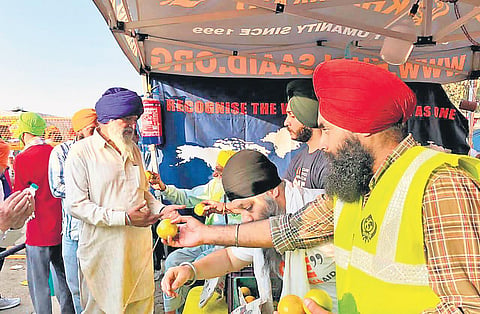

Amid the protests, and several rounds of meetings over the farm bills, Khalsa Aid — an international NGO that provides humanitarian aid in disaster and conflict-torn places, is one of the organisations providing 24/7 assistance to the 1.5L farmers protesting at Singhu border and 3L at the Tikri border. Amarpreet Singh, Director (Asia Pacific), Khalsa Aid, India, has been at Singhu border from Day 1 of the protest. Singh hails from Patiala, and has been with Khalsa Aid since its inception in India eight years ago.
Edited excerpts:
What all relief work have you been doing at the protest sites?
We started off with langar on Day 1, November 28. Gradually, many local communities came forward to serve food. By then we realised that the farmers didn’t have daily necessities such as undergarments, towels, toiletries and sanitary kits. So, we ensured the fulfilment of these on ground zero. We keep all the items — toothpaste, oil, soap and more, in baskets at our stall for three hours in the morning and the evening. People are free to take whatever they want.
How many volunteers are on the ground and how do you coordinate the requirements?
Our 150 volunteers from Delhi, Punjab, Haryana and Rajasthan have been working at both borders. We hold daily meetings with our teams, and send a list of the requirements to our Delhi coordinator, who send these requests to donors, and by next morning we receive the supplies. The stall shuts at 10:00pm and opens again at 4:00am. But our team works in two shifts, which means we are providing 24/7 assistance to the farmers.
What are the latest arrangements that have been made?
We had tried speaking to resort and farmhouse owners on the highway to use their spaces for accommodation. But they didn’t allow us out of fear their properties may get harmed. So, two days ago, we readied a 400-bed shelter with water-proof tenting in an open area near Singhu border. Here, we
arranged mattresses, pillows, bedsheets and blankets for farmers. We have also set up 50 washrooms with hamams (traditional manual geysers) and washing machines. Earlier, we had arranged portable toilets but disposing of the waste was becoming a problem, so we constructed semi-permanent toilets with pits.
Where do you get the funding from?
Ours is a registered organisation and people in India and abroad have been donating to us through our website (khalsaaid.org.) We did not hold any special fundraiser and are not taking money in the name of farmers. We are doing whatever best we can do, and there is no limitation on expenses. Sometimes, people directly come to our stall with donation material like a truck full of biscuits, eatables or other items. It is not just Punjabis who are helping. We have got a lot of support from Haryana residents as well.
Did you face any trouble from the police or administration?
Not at all. Police are doing their duty and we are doing ours. They also come to our stalls for food and other supplies. Everything is going on very smoothly.
A lot of reports have revealed that COVID precautions are not being followed at the protest site. Don’t you think this can lead to community spread?
Yes, but the crowd here is huge. I interact with thousands of people every day, but everything is going well. Though we are distributing masks, people don’t seem very interested in wearing them. We sanitise our shelter and toilets every day. We have even installed automatic hand sanitising machines at our stalls. But we have not reported any severe illnesses, though some elderly are facing problems because of the cold.
A message to people of Delhi.
I heard some people saying: “Ye (farmers) toh vehle log hain, ghar se uth k a gye hain [These are idle people, have come from their homes]. I want to tell them that even big farmers and zamindars have come here. It is a positive sign that dialogue is happening, and hopefully, we will get a positive decision soon.